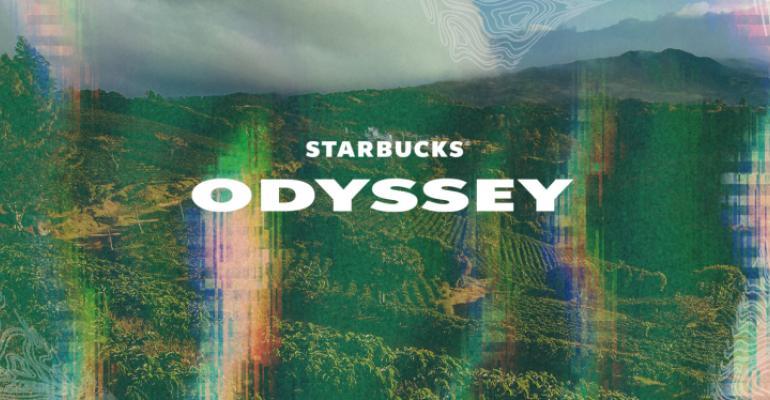In Sept. 2022, Starbucks officially unveiled its highly anticipated foray into the metaverse: Starbucks Odyssey. At the time, NFTs and the metaverse were the trendy tech innovation of the moment, with businesses across many sectors scrambling to figure out how to cash in on the popularity of Web3, which was promised to be a more immersive “Internet of the Future.” Eighteen months after unveiling Starbucks Odyssey, the Seattle-based coffee company has confirmed that the program — which has been in beta mode for 15 months — will officially end at the end of the month.
“On March 31, 2024, we will sunset Starbucks Odyssey Beta so we can focus on the program's future and bring experiences to a broader audience,” a Starbucks spokesperson said in a statement. “We’re looking forward to applying our learnings to the future of this program and are grateful to the Odyssey community for their participation in the beta experience. We’re excited for what comes next, but don’t have details to share about the future of the program at this time.”
While the announcement comes as no surprise — it has been a while since the metaverse and NFTs captivated audiences and motivated tech companies — Starbucks ending Odyssey in its current form signals the closing of a chapter in the history of restaurant technology.
While the coffee chain was not the first to dabble in Web3 digital marketing capabilities — Chipotle first debuted virtual games on Roblox in 2021 and the Wendyverse opened in April 2022 — Starbucks’ Odyssey project was one of the most high-profile metaverse projects that offered some of the most potential for long-term digital engagement. The Odyssey project was supposed to go beyond limited-time digital games and introduce Starbucks super-users to a community of likeminded “Siren fans.” The digital universe would encourage them to buy and trade NFTs (rebranded as “Journey Stamps”) and trade them in for Starbucks benefits and experiences, up to and including a high-value trip to a Costa Rica coffee farm.
But since launching the beta version at the end of 2022, Starbucks has been relatively quiet about Odyssey, and there have been no major announcements in the fifteen months since. Likewise, other highly anticipated NFT innovations have faltered in the past year or more, including the wave of NFT membership-based exclusive clubs and restaurants and programs that catered toward the wealthier corners of Silicon Valley. But last year, many of these projects were delayed (sometimes indefinitely) or quietly canceled as the hype for virtual restaurant experiences died down.
While it looks like the shelving of Starbucks Odyssey might be the nail in the coffin for the metaverse trend (at least, in the foodservice sector), the excitement around Web3 and NFTs was rooted in the very real needs of today’s consumer: digital engagement and continued technology investment.
While consumers aren’t necessarily clamoring to trade virtual points for the chance to visit a Starbucks coffee farm, they do want digital technology to quell customer experience-related frictions and to make their lives easier. Even though it is not quite as flashy as the once-intriguing Odyssey universe, technology like Starbucks’ digital order status boards (introduced as part the company’s new accessible store designs), could prove to be more popular in the long-run.
In hindsight, restaurant operators might see the metaverse as a momentary, shiny distraction from why their customers visit them regularly: not to play games in a virtual world, or trade digital collectibles, but to order their favorite foods and drinks as easily and quickly as possible, with a consistent experience every time. By stepping back from Odyssey, Starbucks has quietly proved that refocusing on digital technology as a tool of customer success rather than a fun gimmick is crucial.
Contact Joanna at [email protected]m

